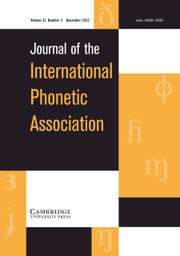Article contents
The brogue that isn't
Published online by Cambridge University Press: 06 February 2009
Extract
We have all heard of the remote community in the Appalachians (or is it somewhere in the North of England ?) where the locals still supposedly speak pure Elizabethan English, unchanged for centuries. But this is not the only dialectological myth which persists tenaciously in the popular imagination and will no doubt continue to do so despite its lack of factual basis.
- Type
- Articles
- Information
- Copyright
- Copyright © Journal of the International Phonetic Association 1980
References
- 4
- Cited by




